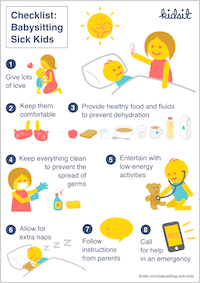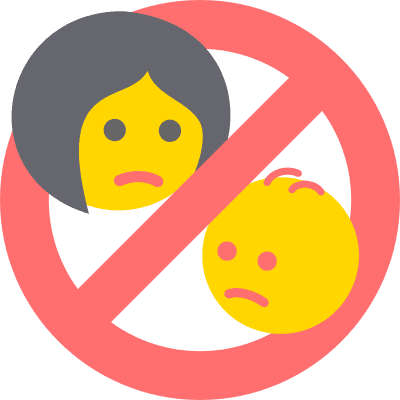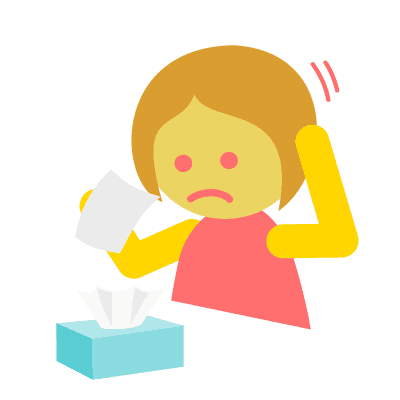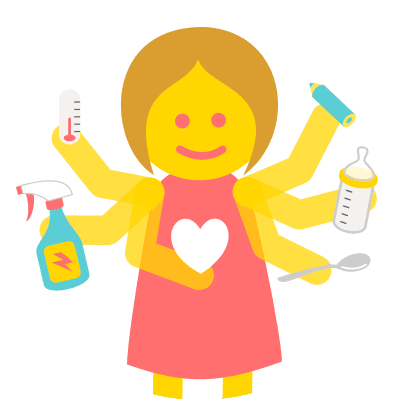How to Babysit a Sick Child (11 Care Tips + Video)


Written & Illustrated by
Matthew James Taylor
Kidsit Founder, General Manager

Babysitting Video by
Lydia Kutz
Babysitter, Infant Swimming Resources Instructor

Medically Reviewed by
Gina Maria Jansheski, MD, FAAP
Board-Certified Pediatrician, Medical Reviewer
Key Takeaways
- Never administer medication without explicit permission and clear instructions from the parents.
- Prioritise comfort and care - offer love, reassurance, a calm environment, and handy low-key activities.
- Offer plenty of fluids and gentle food to support hydration and ease symptoms.
- Encourage rest and quiet time, adjusting your pace to match the child’s energy levels.
- Maintain strict hygiene and cleanliness to prevent the spread of germs (handwashing, cleaning surfaces, washing toys).
- Protect yourself too - limit exposure, use protective measures, and take health precautions.
- Follow parental instructions closely and keep them informed, and don’t hesitate to call in emergencies.
It's never convenient when a child is sick, but as a babysitter, you can't avoid it forever.
When my kids are sick, I know it's time to slow down and give them the attention they need.
With a little love, you can turn an annoying illness into a bonding experience.
Here's what works for me.
- Never give medicine to children without parent permission.
- Give a sick child lots of love.
- Make sure they're comfortable.
- Keep up their fluid intake to prevent dehydration.
- Feed them healthy food.
- Allow for extra nap time.
- Provide low-energy entertainment.
- Keep everything clean and wash hands frequently to stop the spread of germs.
- Reduce physical contact to prevent getting sick.
- Follow parents' instructions (if babysitting).
- Make a call for help in an emergency.
Download our Checklist for babysitting sick kids and read on for all the details.
Lydia has been working in the childcare industry for 15 years, and owned a childcare agency in Florida, USA for 7 years. She has had many sick kids in her care over that time, in this video she shares her ideas on what to do if the kids you're babysitting are sick.
1. Never give medicine to children without parent permission
Number 1 rule of babysitting, DO NOT ever administer medicine to children without parent permission or guidence.
There was a story locally about a babysitter who administered Benadryl to a baby and overdosed the baby and the baby passed away. So it is very, very, very important that you do not administer any medicines to anybody any age that you're babysitting for unless the parents have asked you to do it or you get the parents permission. No matter how sick they are. Just keep the parents informed and I'm sure they will give you permission. But doing it without their concent or knowlege is not okay.

Babysitter, Infant Swimming Resources Instructor
St Petersburg, Florida, United States
2. Give sick children lots of love
Love is one of the best cures. Show sick kids how much you care, give lots of reassurance and check on them often.
Nurturing and TLC helps to reduce anxiety, and it makes little ones feel safe. Give a sick child lots of caring attention, and it can actually help them get better quicker (source).
Read our article: How babysitters can nurture children and learn eight steps that help to bring out their best.
Attend to their needs and take the time to listen. They will appreciate your presence, along with the extra patience and understanding.
Keep them updated. If you need to leave the room for 5 minutes, tell them you’ll be back soon. It's really comforting for them to know their caregiver is close by.
Try one of our recommended baby monitor apps, so you know the moment your child wakes up.
Make them feel special. Treat them like a grown-up by allowing them to do more mature things such as drinking an herbal tea or having their meals on a breakfast-in-bed tray table outfitted with a folded napkin, special utensils, and maybe even a small flower in a vase.
And don’t forget...
Tell them you care about them and hope they feel better very soon. You might be thinking this, but it means a lot to actually say it.
Often, a sick child can become irritable and may misbehave because they feel bad, but please be easy on them. Read our guide: How to babysit difficult children for some helpful strategies.
3. Keep sick kids comfortable
To start with, get the house at the right temperature. If it's cold, put the heater on. If it's hot, open windows to let a light breeze through. Fresh air is better than air conditioning when you're sick (if it’s not too hot.)
Be careful when using a heater. Be sure to read our fire safety tips for babysitters and prevent any accidents.
Make sure your little patient is dressed in soft and comfortable clothes, pajamas are perfect.
Comfortable house shoes are good too, and kids love wearing mom or dad's slippers for fun, so let them.
Now it's time to find a comfy place to hang out and rest. The bed is often the most comfortable place, but the couch has better entertainment options if they are up to it.
Build a pillow fort in the lounge room with cushions and blankets and let them camp out for the day.
Avoid outdoor play if it's cold or wet, which can make symptoms worse.
4. Offer plenty of fluids to prevent dehydration
Always have a glass of water available and encourage drinking fluids throughout the day.
Green and black tea with antioxidants can alleviate flu symptoms, try cooling it down a little before serving just to be safe.
Sports drinks with electrolytes help to replace more than lost fluids, and kids love them.
Avoid sugary drinks, like soft drinks and fruit juice, because they cause a spike in blood sugar followed by a crash that can be difficult to handle when you're sick.
Mix drinks together and create magic healing potions to make drinking fun.
But most importantly, don’t forget...
Water.
Good old-fashioned water is the best fluid to give sick (and well) children. Carbonated water can soothe a sore tummy, and plain, room-temperature water should be given frequently in very small quantities for a child that has had vomiting and/or diarrhea. People tend to forget this, but it is what nature intended.
5. Provide healthy comfort food that’s easy on the stomach
You can't beat the classic chicken and vegetable soup for colds, flu, or fever with its vitamins, minerals, protein, and plenty of liquid too (source).
Sugar-free ice popsicles can soothe a sore throat.
Honey can medicate an infected throat with its antibacterial properties, and it tastes yummy. It has also been shown to soothe and calm a cough (source), (source) but never give honey to a child below one year of age due to the risk of poisoning by the spores that cause botulism (source), (source).
Plain yogurt that contains live bacterial cultures (read the label to be sure) can boost healthy gut bacteria, which is especially useful after a course of antibiotics. Add your own fruit when you serve it to keep it healthy.
The B.R.A.T diet is gentle on the stomach for diarrhea (Bananas, Rice, Applesauce, and Toast). (source) Most cooked vegetables with a little salt but not other spices are also helpful to give nourishment when the stools are loose. And soups can help replace lost fluids. Raw and fried foods should be avoided.
For a sick child with a loss of appetite, try making eating fun by creating animals out of food or cut shapes into toast. I find the occasional treat helps tempt a fussy eater too.
Must read: Babysitters complete guide to food safety.
6. Give sick children lots of quiet time and rest
It’s normal for a sick child to sleep a lot. Their little body is tired because all their energy is being used to fight the illness.
Allow for extra naps and let them rest as much as they need wherever they feel most comfortable, which may be on the couch or curled up with a blanket and pillows on the lounge room floor, that’s fine.
Keep the house quiet and calm, so you don’t disturb them while they’re resting.
You’ll know when they start feeling better because their energy levels will slowly return and they’ll get hungry!
Read our essential guide: how to get kids to bed when babysitting for useful tips for dealing with difficult sleepers.
Once kids are snoozing, learn what to do after the kids are asleep to make the most of your downtime.
7. Entertain sick kids with low-energy activities
Sick kids don’t have a lot of energy, so easy activities are the best entertainment options. Here are my favorites:
If your child is stuck in bed, then reading books can be a great option. Bring over their favourite stories and let them pick which ones they want to hear. Try replacing the main character’s name with your child’s name for added fun and engagement.
See our recommended books for babysitters for some of the best story ideas for all ages.
Look through old family photo albums and let them share memories from the past. Tell stories from when you were young.
Sing songs and nursery rhymes and do the actions together. Make their teddy or favorite toy dance along and see if you can get them to giggle.
If your child can get out of bed, there are a lot more options...
I find easy collaborative games that are not competitive to be best for sick kids. Blocks and legos are brilliant. Try building a hospital, a space station, or a zoo house.
Drawing and crafts are great activities because they are fairly relaxed and you can create something beautiful together.
Try pretend play with toys, dolls, teddies, or action figures. Teach kids about being sick by pretending to be a “doctor” for their toy and can check their temperature, give them pretend medicine, and put them in bed to rest. This kind of play will help your child understand sickness and the recovery process (source).
For talkative kids, try video calling friends or family, Grandma or Grandpa would love to hear from them!
Importantly...
Try to avoid too much screen time. Computer games and TV can make a child feel socially isolated, which can prolong recovery (source).
See our huge guide to entertaining kids, with over 200 activities. You'll never run out of ideas.
8. Keep everything clean to stop the spread of germs
Cleanliness is one of the best defenses against unwanted germs and sickness.
I recommend these essential hygiene tips:
- Keep your child's face and hands clean with a warm washcloth.
- Wash your hands regularly with antibacterial soap or hand sanitizer. (video)
- Empty the bin of any used tissues or rubbish regularly.
- Keep the air fresh and clean by opening windows (if it's not too cold outside).
- Change their clothes and sheets if they are dirty or sweaty.
- Wash their toys, particularly if other children will be playing with them.
Kidsit babysitting statistics
36.81% of babysitters offer cleaning as an extra service, but when a child is sick you want to do this regardless.
(Babysitting statistics calculated weekly from our live member data — Updated 31 Jan 2026)
9. Avoid getting sick!
As a sitter you should be taking care of you, eating healthy, drinking plenty of water, washing hands, it just comes with the job. Working with kids, dealing with their poop, their spit-up, and snotty noses... kids are known for kind of being germy so you should be taking care of yourself and making sure you are healthy.

Babysitter, Infant Swimming Resources Instructor
St Petersburg, Florida, United States
Caring for a sick child often requires close contact, but that doesn't mean you have to catch what they have.
Try these helpful tips to limit your exposure to germs:
- Avoid skin contact, such as touching your face with a contaminated hand, particularly around your eyes, nose and mouth.
- Wear a face mask if they're coughing or sneezing a lot, and have them wear one too. Draw a smile or teeth on it if you want to be funny.
- Wear gloves when cleaning any sickness-related messes.
- And be sure to gargle at the slightest hint of a tender or scratchy throat to prevent any viruses or germs from taking hold (source).
Despite your best efforts, there's still a chance that sometimes you will get sick. If so, can you still work? See our article Should you babysit when sick? for some helpful ways to manage this situation.
10. Follow instructions from parents when babysitting
Always ask parents for detailed instructions before starting a babysitting job with a sick child.
Both the sitter and parents should know what is expected of them, and have a line of communication that is best kept open at all times.
Get permission before giving medication or any type of treatment, and only use medicines that parents have directed you to use. Instructions for medications to be given by a sitter should always be in writing, so you don’t have to rely on your memory for the dose and when to give.
Let parents know if symptoms change, and reassure them that everything is under control.
Be prepared to take the child to the family Doctor if you are asked to.
Don't be afraid to call if you have a question or you need help.
11. Call for help in an emergency
Always be safe, extra cautious, and don't hesitate to call for help in an emergency situation.
Make sure you know the emergency number in your country:
| Country | Emergency number |
|---|---|
| Australia | 000 |
| New Zealand | 111 |
| United Kingdom | 999 |
| Canada | 911 |
| United States | 911 |
Download our free emergency contact sheets so you have all the important numbers if ever you need them!
Be sure to read our guide on How to be a safe babysitter for essential safety tips while looking after kids.
For career babysitters, you may even consider getting insurance, see our article: Do babysitters need insurance to learn if this is right for you.
Conclusion
I try not to babysit sick kids because I also have to babysit a bunch of other kiddos and I don't want to spread it. I do a good job of keeping myself healthy, and I try to make parents aware that they're not the only family that I babysit for. They wouldn't want me to bring a sickness from another family to their family's home.

Babysitter, Infant Swimming Resources Instructor
St Petersburg, Florida, United States
Caring for sick children is not so difficult when you know what to do.
Not all babysitters are willing to do this kind of work, but if you do, you can charge more for babysitting sick kids. So it can be worth it for financial reasons.
Read our babysitting rate guide and learn how to negotiate a babysitting pay rate so you can charge more for babysitting sick kids.
Nursing a sick child is also a rewarding experience because you have an opportunity to bond with the child and make a difference they will remember.
It can make you both happy, and that's something well worth doing.

Babysitting Sick Kids (Checklist)
Download and print out this checklist so you know exactly what to do if you're ever babysitting sick children.
Keep a copy in your babysitting binder so it's always with you.
(babysitting-sick-kids-checklist.pdf 37kb)
Download our other babysitting checklists.
Should you babysit when sick? See our guide to learn when babysitting while sick is okay and when you should politely refuse.
Have you missed sleep during an overnight babysitting job? Read our guide to babysitting night shifts to learn the secrets of maintaining a healthy sleep routine while working through the night.






























